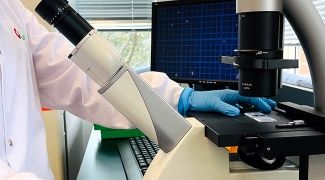Sickle cell disease and the need for blood from African, Caribbean and Black communities
Tuesday, June 11, 2024 Aldis Brennan
Sickle cell disease is an inherited condition most commonly affecting people of African, Caribbean, Middle Eastern and South Asian ancestry. To manage the disease, many people living with sickle cell disease need regular blood transfusions or red blood cell exchange. For the best health outcomes, a donor who shares the same markers on their red blood cells (known as antigens) — which are also inherited — is needed. Because red blood antigens are inherited, recipients that require rare blood are more likely to find a match in donors who share similar genetic ancestry. As a result, we need more donors of African ancestry to meet the needs of people with sickle cell disease.
The Sickle Cell Disease Association of Canada, under Biba Tinga’s leaderships, has been working tirelessly to increase awareness of and need for blood donation from people of African ancestry. Some of their efforts were done collaboratively with Canadian Blood Services. To that end Dr. Jennie Haw, social scientist at Canadian Blood Services, has been working with Biba to study the priorities for communities of African ancestry and barriers to blood donation.
Community priorities include things like inequitable health services, concerns around gun violence, job security and unemployment, as well as healthcare disparities related to sickle cell disease.
“For some, a reason they cannot or don’t donate is deferral criteria for things like malaria,” Dr. Haw says, referring to restriction on donating blood if a person has ever had malaria. “Our research also shows that barriers to donation are complex and interact with each other. Changing deferral criteria while maintaining safety of the blood supply is necessary and must be coupled with additional work to reduce other barriers.”
Biba and Dr. Haw have collaborated on several community-based research projects over the years and have found that some members of the African, Caribbean, and Black community grew up hearing that blood operators don’t want blood from “people who are Black.” Other barriers include lacking information on the blood system, the process of donation (including where the donated blood goes), and the impact of donation on their physical health. Many participants wanted Canadian Blood Services to be more present in their communities.
“We know that if we can diversify the donor base, that will put us in a better position to provide more equitable health care and blood products to all people across Canada,” Dr. Haw says.
Canadian Blood Services – Driving world-class innovation
Through discovery, development and applied research, Canadian Blood Services drives world-class innovation in blood transfusion, cellular therapy and transplantation—bringing clarity and insight to an increasingly complex healthcare future. Our dedicated research team and extended network of partners engage in exploratory and applied research to create new knowledge, inform and enhance best practices, contribute to the development of new services and technologies, and build capacity through training and collaboration. Find out more about our research impact.
The opinions reflected in this post are those of the author and do not necessarily reflect the opinions of Canadian Blood Services nor do they reflect the views of Health Canada or any other funding agency.
Related blog posts
Canadian Blood Services is looking forward to connecting with members of the transfusion community at CSTM 2024, happening this May in Saskatoon! In this second post in a series of blogs counting down to CSTM 2024, Dr. Jennie Haw shares her insights in lead-up to the event.
Awa Diagne, a research assistant at Canadian Blood Services, describes her experience working on the Piloting and evaluating a community-led strategy for diversifying the stem cell registry project over summer 2023.
Hematopoietic stem cell (HSC) transplantation therapy is used in the treatment of various blood disorders including leukemia, lymphoma, and sickle cell anemia. A recent review article published by Dr. Hari Maganti’s lab explores current advancements in pre-clinical research on the biology and mechanism of HSC homing and engraftment following transplantation.


